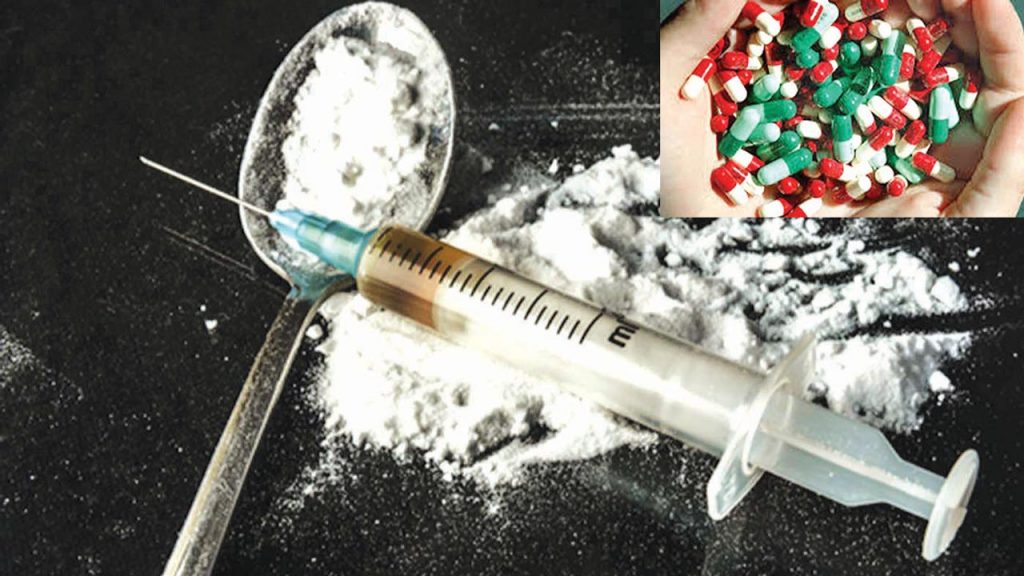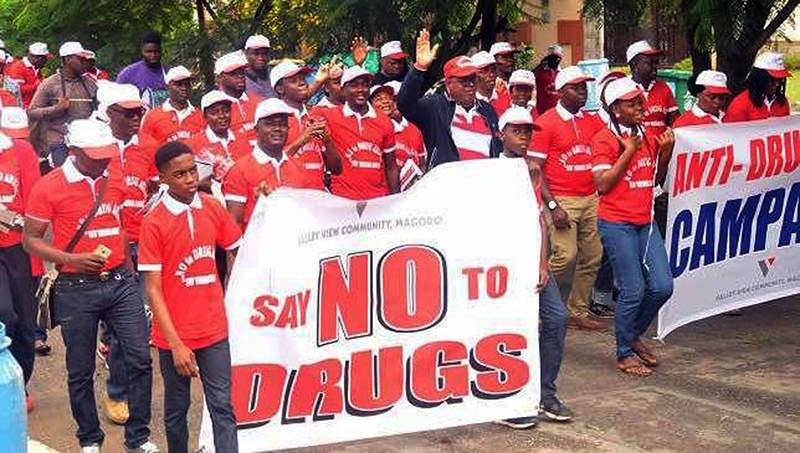
Credit: The Guardian
Drug abuse among youths and students in Nigeria has been a serious concern. A study by the National Bureau of Statistics and the Centre for Research and Information on Substance Abuse revealed that about 14.3 million Nigerians between the ages of 15 and 64 abuse drugs, with many young people using a variety of substances, including marijuana, codeine, tramadol, and other prescription drugs.
According to a report by the United Nations Office on Drugs and Crime, Nigeria has one of the highest rates of drug abuse in Africa and this has been a major concern to parents and teachers who believe it will deal a devastating blow on the mental ability and the general health of the students.
At present, the drug market is populated with different drugs, too numerous to mention that it is almost impossible for any day to pass by not seeing a group of students buying or taking one form of drug or the other. For instance, a popular song by a Nigerian musician about “science students” is suggestive of how drug abuse and addiction has penetrated our education system.
Checks by BlackCampus revealed that drug within the market seem to be divided into two segments. While one seems to cater for the students from wealthy background in the society, the other serves the less privileged who take solace in the consumption of overdosed-cough syrup or go to the extent of inhaling gas coming from their school latrines when it is so sunny just to get “high.”
Reasons for drug abuse/addiction
Many concerned individuals have said several factors are responsible for drug abuse and addiction among Nigerian youths and students. One of these factors, they said is pressure group which has pushed many students taking into drug to appear cool and trendy.
According to Ronke Adediran, a teacher in one of the secondary schools in Lagos, lack of parental supervision can drive a student into drug addiction. She said, “some parents are not actively involved in their children’s lives, which can leave their children vulnerable to drug abuse and at the end of the day cause serious damaging effects to their lives.”
For Ajibola Olokun, a parent and a trader; availability of drugs which are widely circulated in Nigeria allows students and young people to be exposed to drugs through drug dealers or friends who use drugs regularly. She said, “students will continue to get involved in drugs if there is availability of drugs in the society.”
Ayodeji Lawal, a student of material engineering, University of Lagos said, lack of awareness and poverty are the two major reasons why students take to drugs. For him, some students may not be aware of the dangers of drug abuse or may underestimate risks associated with drug addiction, adding that poverty is another major factor contributing to drug abuse, as students and young people may turn to drugs in order to escape from harsh realities of their lives.
He adds, “mental health issues, such as depression and anxiety, can also contribute to drug addiction among young people.”
“…drugs within the market seem to be divided into two segments. While one seems to cater for students from wealthy backgrounds in society, the other serves the less privileged who take solace in the consumption of overdosed cough syrup or go to the extent of inhaling gas coming from their school latrines when it is so sunny just to get”
Looming danger
No doubt, the proliferation of drugs and its increasing consumption by students is viewed to be a major public health concern in Nigeria. Many of these drugs are taken in overdose and resulting in the increase in health risk.
It was as a result of this that The National Agency for Food and Drug Administration and Control (NAFDAC) organized a sensitisation programme on dangers associated with drug abuse in Kaduna State in 2022.
According to the agency, the spate of drug abuse among the youth is “worrisome,” adding that the agency embarked on the sensitization programme to address the menace.
Speaking on the programmes, the state coordinator of the agency, Mr Nasiru Mato said, “We started the sensitisation during a one-day event organised by the Kaduna Youth For Good Governance (KYGG).
“The exercise focused on creating awareness on the dangers of drug abuse, and wishes to continue sensitisation by engaging youths in other activities in the state,” he said.
Sadly, experts say drug abuse among Nigeria students can have serious consequences, both in the short-term and in the long-term. Among such consequences is student’s inability to focus and learn, leading to poor academic performance and a lower likelihood of success in school.
It cans also contribute to the development of mental health problems, such as depression, anxiety, and paranoia. Apart, student who is into drug addiction also have a range of physical health consequences, such as liver damage, heart problems, and respiratory issues.
How to stop drug addiction among students

Stopping drug addiction among Nigerian students can be a challenging process, but it is possible with the right approach and support. Joel Akinwumi, a counsellor said, “one of the most effective ways to prevent drug abuse and addiction among students is through education and awareness. Parents, teachers, and other adults in the community can provide information about the risks and consequences of drug addiction and encourage healthy behaviour.”
He adds, for students who are struggling with drug addiction, counseling and therapy can be an important part of the recovery process, as professional counseling can help students to identify the underlying causes of their addiction, and develop strategies for managing cravings and avoiding relapse.
He said, support groups can be a valuable source of support and encouragement for students who are recovering from addiction. According to him, “these groups provide a safe and supportive environment where students can share their experiences and connect with others who are going through similar struggles.”
Other expert who had previously talked about how to control drug addiction among students said, parents can play important roles in preventing drug addiction among their children by monitoring their behaviour, setting clear expectations, and providing emotional support.
This they can achieve by collaborating with schools and other community organizations to provide education and support for students who are at risk of drug addiction. They said, this should include organizing drug awareness campaigns, and implementing drug testing programmes.
They added, it is imperative to ensure that students who are struggling with addiction have access to effective treatment programmes, which can include both inpatient and outpatient treatment options, as well as support services to help students’ transition back to their regular lives after completing treatment.
Conclusion
Experts say stopping drug addiction among Nigerian students requires a collaborative effort from parents, teachers, healthcare providers, and the community as a whole. By working together to provide education, support, and access to treatment, the society can help students to overcome addiction and lead to healthy and fulfilling life.
They also advise government and its agencies to play crucial roles in preventing drug addiction among students and the society at large by providing education and support, and legislating stiff penalties for drug peddling and use.
They say government needs to also embark on non-stop sensitization programmes on television, radio, newspapers and on social media to keep students informed about the dangers associated with drug addiction.





















